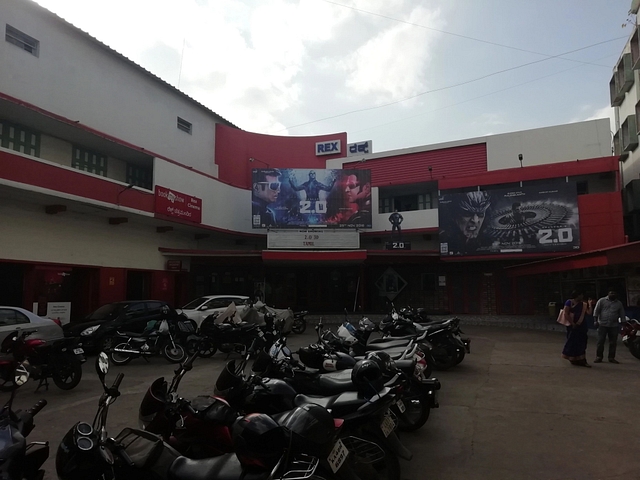
Bengaluru’s Iconic Cinema: Why The Show Must Go On
Rex Cinema in Bengaluru’s Brigade Road is bringing the curtains down on decades of rustic entertainment, but only to re-emerge bigger and better.
As the bell rang in St Joseph’s College bringing the first hour of our classes to an end, we rushed across the street, startling passengers and commuters, to queue up for tickets at an iconic cinema in the Bengaluru city — and this was a regular practice.
Just a few metres down the street stands Rex Cinema, an integral part of the city’s landscape. In our rush to get hold of tickets for a new release at the box office, seldom did we foresee the consequences of playing truant. Nothing stopped us from visiting Rex Cinema because it was associated with a culture wherein our professors visited the cinema as students way back in the 70s. Their profound recollection of the memories of this cinema reassured us of a certain understanding between the generations.
Dormant, Not Asleep
Rex Cinema proprietor Anil Kapur has plans to close the cinema on 31 December. No, the cinema has not reached its end, but is going to undertake a journey of transformation. Kapur is planning to diversify the crowd and expand the horizon of movies in this new phase.
During the British rule, Kapur’s ancestors were engaged in wool trade and later settled, like any other elite of the day, in Bangalore Cantonment, a British area considered as a pensioner’s paradise. The Kapurs took over the Rex property for Rs 8,51,000 during the 60s in a public auction.
Speaking to Swarajya, Kapur recalls the legacy of Rex. “It was initially owned by P V Paul during the 30’s and then was purchased in a public auction by Nand Lal Kapur, my grandfather. It became our first venture in the cinema business. It was a prime property and one of the largest in Brigade Road. We started off by playing English and Tamil films as the area was dominated by English and Tamil speaking population, since Karnataka was carved out of the Madras Presidency. It wasn’t an air-conditioned building, didn’t require the facility given the pleasant weather, but had modest interiors, an exclusive cycle stand and the tickets ranged between 50 paise and Re 1.”
English movies dominated the screens in the initial days. Disney’s Sleeping Beauty was the first English film that hit the Rex screen in 1963, followed by many Hollywood blockbusters that attracted the elite class of the city. However, Rex Talkies, as it was earlier known was categorised into four stalls - front, middle, rear and the balcony with just two annexes (English and regional), from where the rich, middle class and the poor people enjoyed watching movies.
“Although they came from different strata of the society, they enjoyed the same moment and experience of cinema. Hence Rex became a unifying agent in those days. Moreover, in the absence of TV and internet, cinema unified people from various walks of life,” Kaour said.
‘Buckets’, Not The Gandhi Class
Dr Christopher Hoskins, professor of Political Science at St Joseph’s College said, “Rex was a theatre popular for screening epic movies. I have watched movies like The Great Escape, Papillon and I was amused with the ambiance and sound system that Rex had to offer. I felt that everything was in place and it was very organised with the crowds being managed in an orderly manner. During the 70s we occupied the row right in front of the screen, and we called it the ‘buckets’. The audience was well behaved, and I feel people who felt the desire to learn English, managed to speak the language after coming here to watch the Hollywood epics.”
Post 1974, Rex became the talk of the town, thanks to its new interior design that gave it a refurbished look along with its food stalls . The new look increased its popularity, with the screening of undisputed Hollywood films produced by Colombia Pictures and 20th Century Fox becoming a major attraction at Rex. Cliffhanger dominated the screen for 32 weeks making it the longest run film in this theatre, followed by Return of Dragon that prolonged for 27 weeks.
Seven Shows, Not Four
The shutting down of Rex will have far-reaching implications for the employees, who are dependent on the theatre’s business for quite a while now. However, Rex Cinema general manager Abhishek Sood has dealt with this issue by helping employees find similar jobs at multiplexes nearby.
Commenting on the outstanding business strategy of Rex Cinema, Sood says: “This is the only theatre which plays seven shows in a day depending upon the duration of the movie. Besides, we have also screened movies of five different languages in one day, which earning us more footfall, setting us apart from other single screen theatres.”
Prem Koshy, owner of Koshy’s, a popular restaurant that has been a part of Bengaluru’s legacy on St Marks Road, said: “I personally have a very emotional connection with Rex. Anil’s family and my family are well knit, and my friendship with Anil has been for years. For me Rex is more of a friend than Anil, because it had the best hospitality. My last words for Rex would be ‘Bigger and Better’, and I would always be their well wisher.”
Rex will screen its last show on the last day of 2018, and will make way for a mall, as usual, to be built in its place.
(With inputs from Sanath K Prasad)